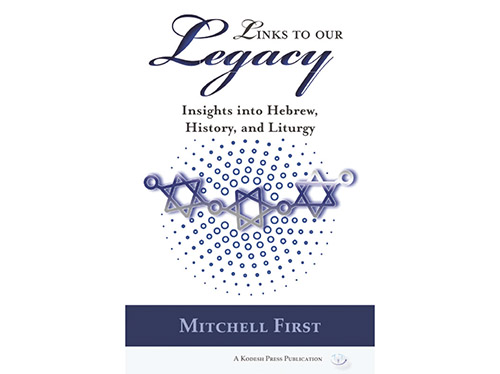

Highlighting: “Links to Our Legacy: Insights into Hebrew, History and Liturgy” by Mitchell First. Kodesh Press. 2021. English. Paperback. ISBN-10 : 1947857665.
In 2015, attorney Mitchell First started writing columns in The Jewish Link about his real passion: Jewish history and etymology. He has just published his second collection of columns, and fourth book, “Links to Our Legacy: Insights into Hebrew, History and Liturgy,” available from the publisher, Kodeshpress.com, Teaneck’s Judaica House and Weinreb’s, as well as Amazon.
The book is divided into three sections: Hebrew Roots, History and Liturgy. While the articles are from published and soon-to-be published columns, the book format gave First the space to enhance the chapters with footnotes and more Hebrew. Regular readers of the columns will find additional new material to delve into, and will appreciate having the columns in book form as a reference.
First began writing columns about the holidays, a topic he got to know writing his second book, “Esther Unmasked,” 11 scholarly articles about all the Jewish holidays, published in 2015. He planned next to write largely about tefillah, summarizing material in a forthcoming book by a liturgy expert. When that book was delayed—it’s still being edited—he switched gears to research and write about other subjects in Jewish history, rituals and Hebrew language that piqued his interest. After taking a few months off from writing his column to prepare the book for publication, “Roots and Rituals” was published in 2018. The book garnered an excellent review in the Jerusalem Post.
For both “Roots and Rituals” and “Links to Our Legacy,” First chose the columns he thought made a significant contribution to understanding the topic he was writing about. This time, there was no interruption in his weekly columns—he was home during the pandemic lockdown and was already 50 columns ahead.
First says his approach to writing is to ask himself questions and then research the answers. He has a collection of seforim and scholarly books at home, and has used the extensive library at Teaneck’s Congregation Beth Aaron. He credits Rabbi Moshe Schapiro of Bergenfield, reference librarian at Yeshiva University, for giving him invaluable help by emailing the pages of books he requests, assisted by his associate Rachel Berliner, another Teaneck resident. Rabbi Schapiro was at Congregation Beth Aaron a few years ago, where he met First and told him how much he enjoys the columns. He explained that, as a librarian, he helps many researchers and would be happy to include him.
Research has gotten easier over the years with the advent of the internet. Sometimes First gets inspiration from other websites including Rabbi Reuven Chaim Klein’s blog in “The Times of Israel” and “Balashon—the Hebrew Language Detective.” When he first began writing, he shared the columns with friends to review for accuracy before publication. Although he has more confidence now, he sometimes shares his drafts with Rabbi Ezra Frazer and his very knowledgeable friend, attorney Sam Borodach. When a mistake is pointed out by a reader, First asks Jewish Link editors to make the correction on the website for future readers.
Although First is not employed in academia, he said that noted YU philosophy Professor David Shatz has cited him in a book as an example of a lay person who writes high-quality scholarship. His article on the origin of Taanit Esther was published in “AJS Review,” a prestigious academic journal. He has had articles published in “Biblical Archeology Review,” “Journal for the Study of the Old Testament,” “Hakirah” and the “Seforim Blog.” His first book was “Jewish History in Conflict,” a revision of his master’s thesis on ancient Jewish chronology, published in 1997 and chosen by Jason Aronson Publishing’s Jewish Book Club as their main selection for August that year.
First said some of his articles might be “borderline controversial” since he attempts to answer some long-simmering questions. In an article published in “Biblical Archeology Review,” based on his decades-long research on archaeological findings on the Hebrew alphabet, he posited that the letter “peh” originally preceded the letter “ayin” in the alphabet. This occurs in the second, third and fourth chapters of Eicha and in the first chapter in the Dead Sea Scrolls. He thinks the order was switched after the Babylonian exile. This affects the dating of the acrostical chapters in Tehillim. For example, he said that Tehillim 34:16-18 makes much more sense in the “peh” preceding “ayin” order.
In an article about “Aleinu,” he presented evidence supporting the idea that the original reading in the phrase “letacen olam” has a “caf” and the phrase means “to establish the world under God’s sovereignty,” and not the present reading with a “kuf” which means to repair the world.
First grew up in Riverdale, where his parents, Harry First (z”l) and Judge Lee First were among the founding families of the SAR school and Riverdale Jewish Center. He graduated from Columbia University in 1979. With encouragement from his parents who were both lawyers, he went to Columbia Law School and graduated in 1982. After working for a corporate law firm for a year, he spent a year in Israel where his interest in Judaic studies deepened. When he returned, instead of going for a master’s degree in tax law, he went to Yeshiva University and got a master’s in Jewish history. He joined his father’s firm, which gave him more time to pursue the research that he loved. He married his wife Sharon in 1987, and moved to Teaneck where a good friend of Sharon’s lived, and they raised three children there. His son Rabbi Shaya First teaches physics and Judaic studies at TABC.
There are many more columns in First’s head waiting to be written. “I am very grateful to Moshe Kinderlehrer for giving me the opportunity to write for the Link. It enables me to continually learn new things and later turn my columns into books, which was totally not planned.”
By Bracha Schwartz










